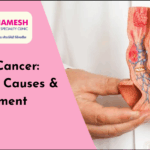Statistics seldom provide a complete picture of a subject or issue. Consider the case of colorectal cancer. The illness is the fourth most prevalent cancer diagnosed in the United States and the second largest cause of cancer-related mortality. It has also been reported that the incidence of new cases and fatalities from colorectal cancer has decreased significantly during the previous four decades.
However, these figures only reveal a portion of the tale. While the total number of cases and fatalities has decreased, particularly among older persons, the number of colorectal cancer diagnoses among young adults has climbed considerably.
Colorectal Cancer in Young Adults: What Causes It?
Researchers are baffled as to what is behind the increase in colorectal cancer among young individuals. However, they are aware of several risk factors for colorectal cancer in older persons, such as obesity, physical inactivity, and smoking, which they have identified.
In conjunction with the growth in early-onset instances, some of those have grown more prevalent over the previous 45 years, who was involved in planning the think tank. As a result, he speculated, it’s plausible that some of the same causes are contributing to the surge in early-onset illness.
What signs and symptoms should you watch out for if you suspect you have colorectal cancer?
Colorectal cancer is increasing among younger individuals, and understanding what signs to watch out for is a vital weapon in the fight against the disease. Colorectal cancer symptoms might be difficult to spot for a variety of reasons.
Colorectal cancer may cause symptoms such as:
- Constipation and diarrhea that continue for more than a few days are examples of long-term changes in bowel habits.
- Anemia of the rectus (bright red blood)
- Stool with blood
- Cramping and discomfort in the abdomen
- Weight loss that was unintentional.
- Fatigue and a feeling of being out of sorts
- Continuous need to urinate, even after using the toilet.
Conclusion
Many variables, such as nutrition, smoking, and high alcohol use, have been shown to increase the risk of colorectal cancer despite the fact that the specific origin of the illness remains unknown. You may contact Dr. Ashish Pokharkar for the best advice and treatment.





